5901 Botham Jean Blvd, Dallas, TX 75215
Can You Recycle Rusty Metal? Efficient Solutions You Should Learn
July 18, 2025Yes, rusty metal can be recycled. Rust does not prevent metal from entering the recycling process. Most scrap yards and recycling centers readily accept rusty metal items.
Rust is simply iron oxide—a natural reaction when metal is exposed to moisture and oxygen over time. While rust alters the outer appearance of metal, the core material retains its valuable recyclable properties, making even heavily rusted items worth recycling.
During recycling, specialized facilities remove rust through methods like shredding and melting. The high temperatures in metal furnaces eliminate rust contamination completely. This purification process allows the base metal to be recovered and transformed into new products with the same quality as those made from virgin materials.
How is Rusty Metal Recycled?
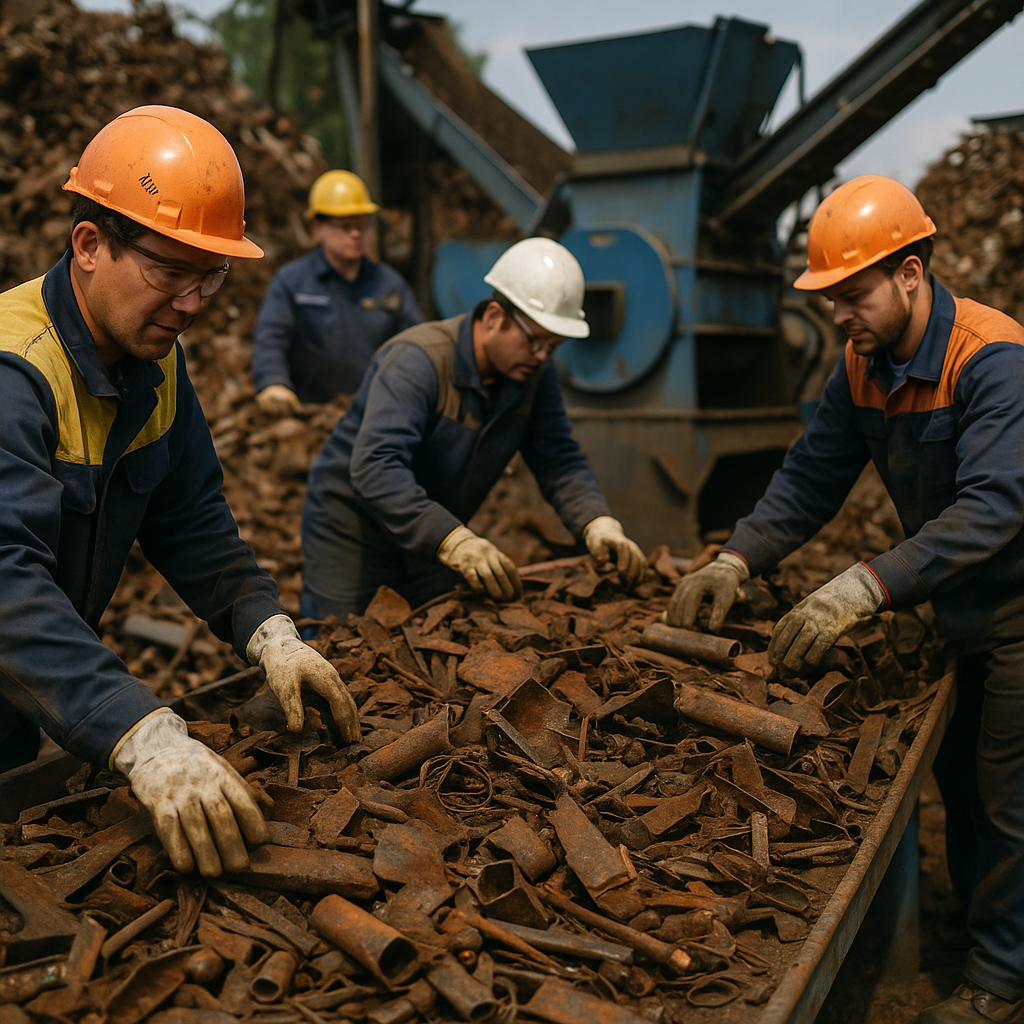
Rusty metal is entirely recyclable, despite its corroded appearance. The recycling process effectively removes rust, allowing valuable metals to be reclaimed and reintroduced into the manufacturing supply chain. This involves several key steps that transform deteriorated scrap into useful raw materials.
Collection and Transportation
The recycling process begins with the collection of rusty metal items from various sources. Scrap yards accept everything from old steel drums to corroded automotive parts. Most metal recyclers sort items based on their material composition and condition at this stage.
Metal quality assessment occurs early in the process, though heavily rusted items may receive lower compensation at scrap yards. While rust doesn’t render metal unrecyclable, it can affect market value since additional processing is needed.
Sorting and Preparation
Once at the recycling facility, metals undergo thorough sorting, ensuring that different metal types remain separate throughout processing. Ferrous metals like steel and iron are separated from non-ferrous metals such as copper and aluminum.
Preparation involves cutting larger pieces into manageable sizes and removing non-metallic components. The scrap is then shredded or granulated to reduce density and increase surface area, facilitating more efficient melting in later stages.
Melting and Rust Removal
The shredded rusty metal is placed into industrial furnaces where high temperatures transform it into liquid form. This melting stage is crucial for rust removal, as iron oxide (rust) separates from the base metal during heating.
The temperature varies depending on the metal type being processed, with steel typically requiring higher temperatures than aluminum. This step purifies the metal by eliminating rust and other impurities that could compromise the quality of the recycled material.
Purification
After melting, the liquid metal undergoes purification to ensure it meets quality standards. Techniques including electrolysis may verify metal purity and remove any remaining contaminants. Quality assessment is critical at this stage to confirm that the recycled metal will perform as expected in new applications.
For heavily rusted items, this purification process may take longer, but modern recycling technology has made this increasingly efficient.
Solidification and Manufacturing
The purified liquid metal is cooled and solidified into forms suitable for manufacturing. These can include ingots, bars, sheets, or specialized shapes based on intended use. Once solidified, the metal is ready to be sold to manufacturers who will transform it into new products.
This transformation completes the recycling loop, with formerly rusty metal becoming valuable raw material for industries ranging from construction to automotive manufacturing. The recycled metal performs identically to virgin material in most applications, requiring significantly less energy to produce.
- Environmental benefits include reduced mining activity
- Energy savings can reach up to 95% for some metals compared to virgin production
- Recycled metal maintains the same structural properties as new metal
- The process diverts waste from landfills and conserves natural resources
Though time-consuming for heavily rusted items, the recycling process effectively reclaims valuable metals from what might otherwise be considered waste. The rust itself is removed during processing, allowing the pure base metal to begin a new life cycle in the manufacturing stream.
What Types of Rusty Metal Can Be Recycled?
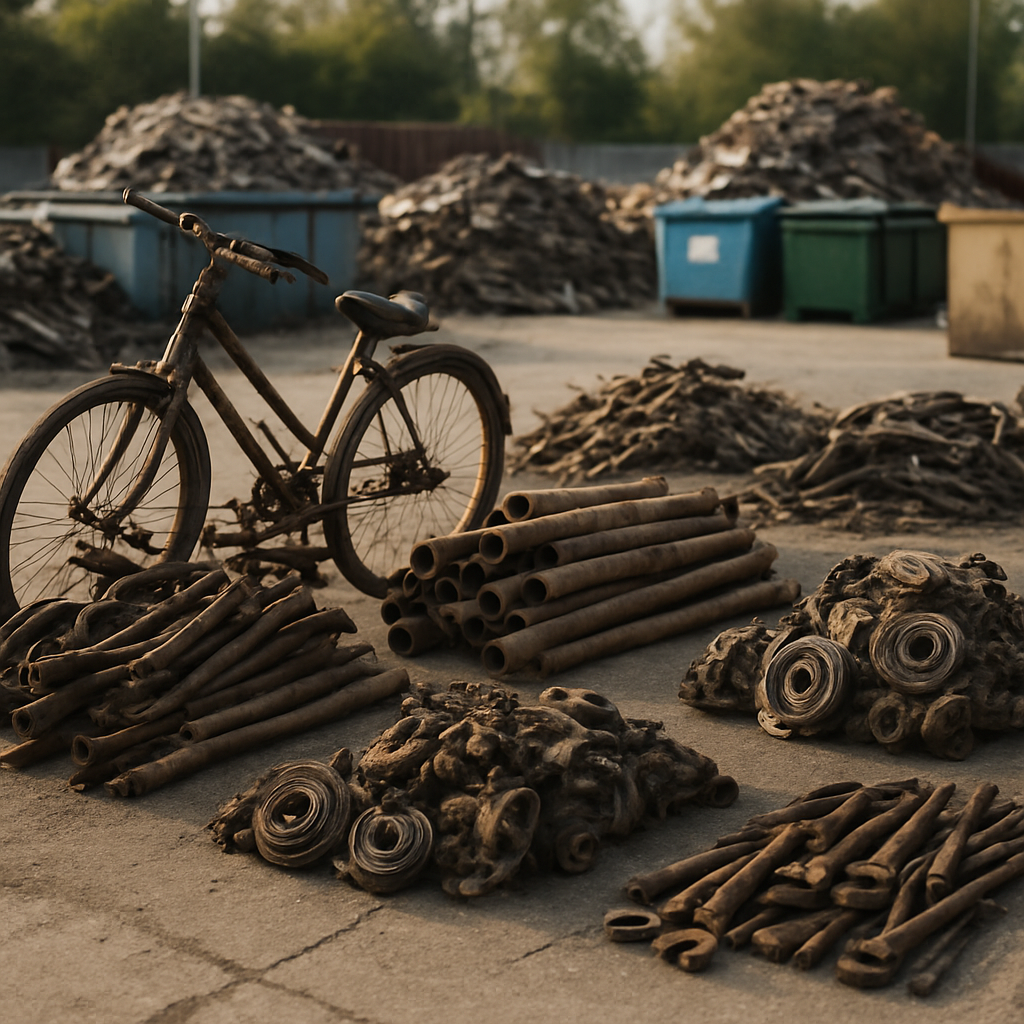
Most types of rusty metal can be recycled despite their corroded appearance. Ferrous metals like steel and iron are commonly recycled even when significantly rusted. The recycling process effectively removes rust through melting and purification, ensuring that even heavily corroded items are valuable for recycling facilities.
Steel, the most widely used metal globally, can be recycled regardless of rust condition. From old garden tools to rusted outdoor furniture and vehicle parts, steel items are ideal candidates for recycling. According to recycling experts, nearly 98 percent of all steel is recycled, and it can be processed multiple times without losing its essential properties.
Iron items, whether cast iron or wrought iron, are also fully recyclable despite rust damage. Rusty gates, pipes, nails, and decorative ironwork can all be processed at recycling facilities. The environmental benefits are substantial, as recycling iron reduces the need for mining new ore, which can pollute waterways and release air pollutants.
While non-ferrous metals like aluminum, copper, and brass don’t rust in the traditional sense, they can corrode or tarnish. These valuable metals remain recyclable even with surface corrosion. Aluminum items such as window frames, outdoor furniture, and old cookware maintain their recycling value regardless of weathering or discoloration.
Copper and brass components, including plumbing fixtures, wiring, and decorative items, are particularly valuable in the recycling stream even when showing signs of corrosion. These metals can be recycled infinitely without any degradation in quality, making them especially important to keep out of landfills.
Common household items that can be recycled despite rust include:
- Old appliances like washing machines, dryers, and refrigerators
- Rusty tools, including hammers, wrenches, and garden implements
- Metal furniture such as patio sets, bed frames, and shelving
- Kitchen items like pots, pans, and cutlery
- Smaller metal objects including jar lids, bottle caps, and hardware
- Nails, screws, and fasteners salvaged from scrap lumber
- Metal fencing, posts, and wire
- Automobile parts and components
When recycling rusty metal, remember that heavily rusted items might be valued lower by weight since rust (iron oxide) weighs less than pure metal. However, the environmental benefits of recycling these items remain significant. During the recycling process, metals are melted down and purified, removing impurities including rust.
How to Prepare Rusty Metal for Recycling
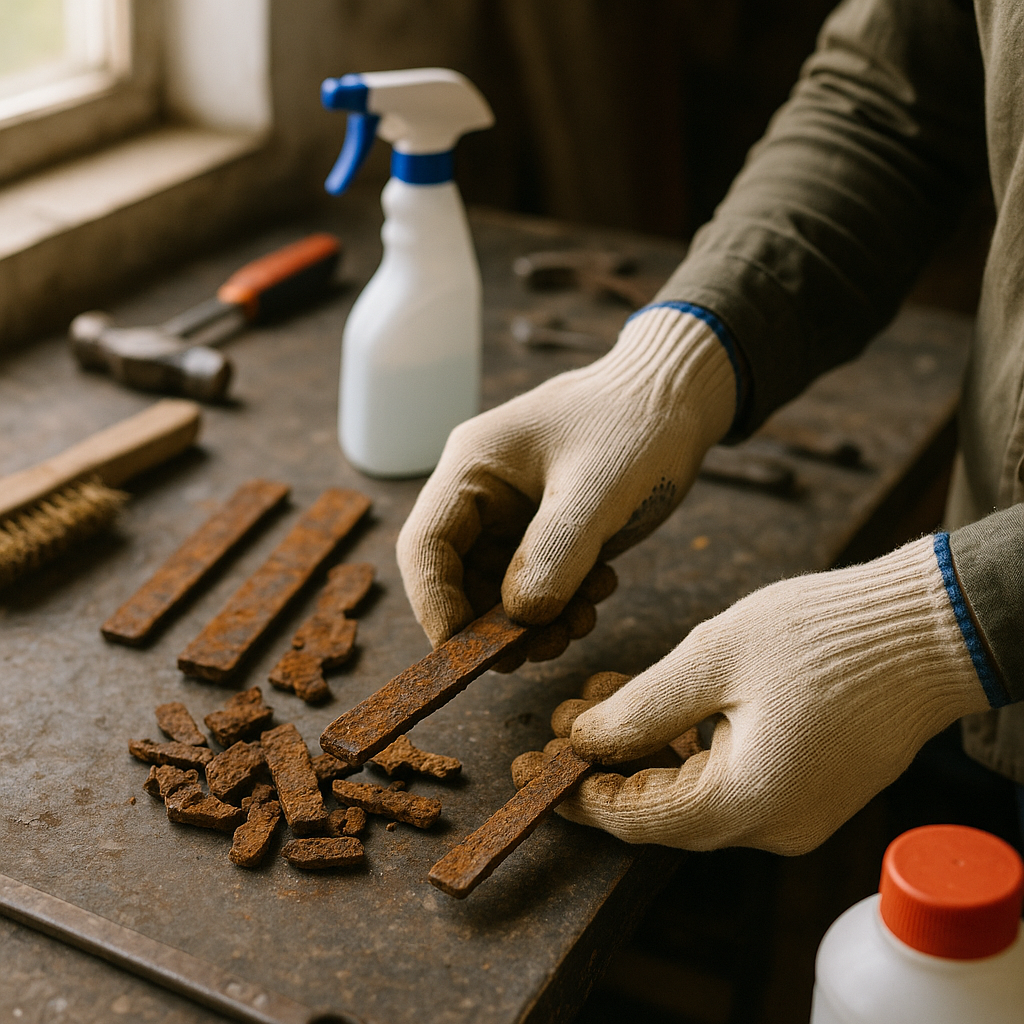
Proper preparation of rusty metal items is essential for effective recycling. Although recycling centers can process rusted metals, following a few simple steps can enhance the process and potentially increase the value of your scrap metal.
Remove Non-Metal Components
Before recycling rusty metal items, remove any non-metal parts such as plastic handles, rubber gaskets, or wooden elements. These materials contaminate the recycling process and reduce the value of your scrap metal.
For electronics or appliances, remove circuit boards, insulation, and other non-metal components to ensure each material can be recycled through the appropriate channels.
Separate Different Types of Metals
Use a magnet to distinguish between ferrous (magnetic) and non-ferrous (non-magnetic) metals. Keeping these separated will maximize the value of your scrap. Ferrous metals like steel and iron generally fetch less per pound than non-ferrous metals such as copper and aluminum.
Sort your metals into clearly labeled containers to prevent mixing. If you combine different metals, recycling centers may pay you based on the least valuable metal in the batch.
Household Rust Removal Methods
Recycling centers can manage rusty metal, but removing excessive rust can streamline the recycling process. Here are some effective household methods for rust removal:
Vinegar Soak
For smaller items with significant rust, submerge them in white vinegar overnight. The acetic acid in vinegar breaks down rust, making it easier to scrub away. After soaking, use a steel wool pad or metal brush to remove the loosened rust. Rinse thoroughly and dry the metal before recycling.
Baking Soda Paste
For light rust on thin metals, create a paste using baking soda and water. Apply the paste to rusty areas, let it sit for about an hour, then scrub with steel wool or a brush. This method works well for items that can’t be fully submerged.
Lemon Juice and Salt
For stubborn rust spots, make a paste using two parts baking soda and one part lemon juice. The citric acid in lemon juice effectively breaks down rust. Apply the mixture to the rusty area, let it sit for at least 30 minutes, then scrub with steel wool or a brush. Rinse thoroughly after cleaning.
Alternatively, sprinkle salt on the rusted area, then squeeze lemon juice over it. Let this mixture sit for a few hours before scrubbing.
Potato Method
This surprising method works well for smaller items. Cut a potato in half and sprinkle the cut side with salt or baking soda. The oxalic acid in the potato, combined with the abrasive quality of salt, helps remove rust. Rub the cut side on rusted areas, and the rust will gradually transfer to the potato.
Final Preparation Tips
After removing rust, rinse the metal items thoroughly to remove any residual cleaning agents. Dry the metal completely to prevent new rust from forming before recycling. Store your cleaned and sorted metals in dry containers to maintain their condition until you take them to a recycling center.
For heavily rusted items that are difficult to clean, still bring them to recycling centers. Most facilities have industrial processes to handle significant rust. The key is proper sorting and removing non-metal components.
By taking these simple steps to prepare your rusty metal for recycling, you contribute to more efficient resource recovery and help reduce the environmental impact of metal production.
Benefits of Recycling Rusty Metal
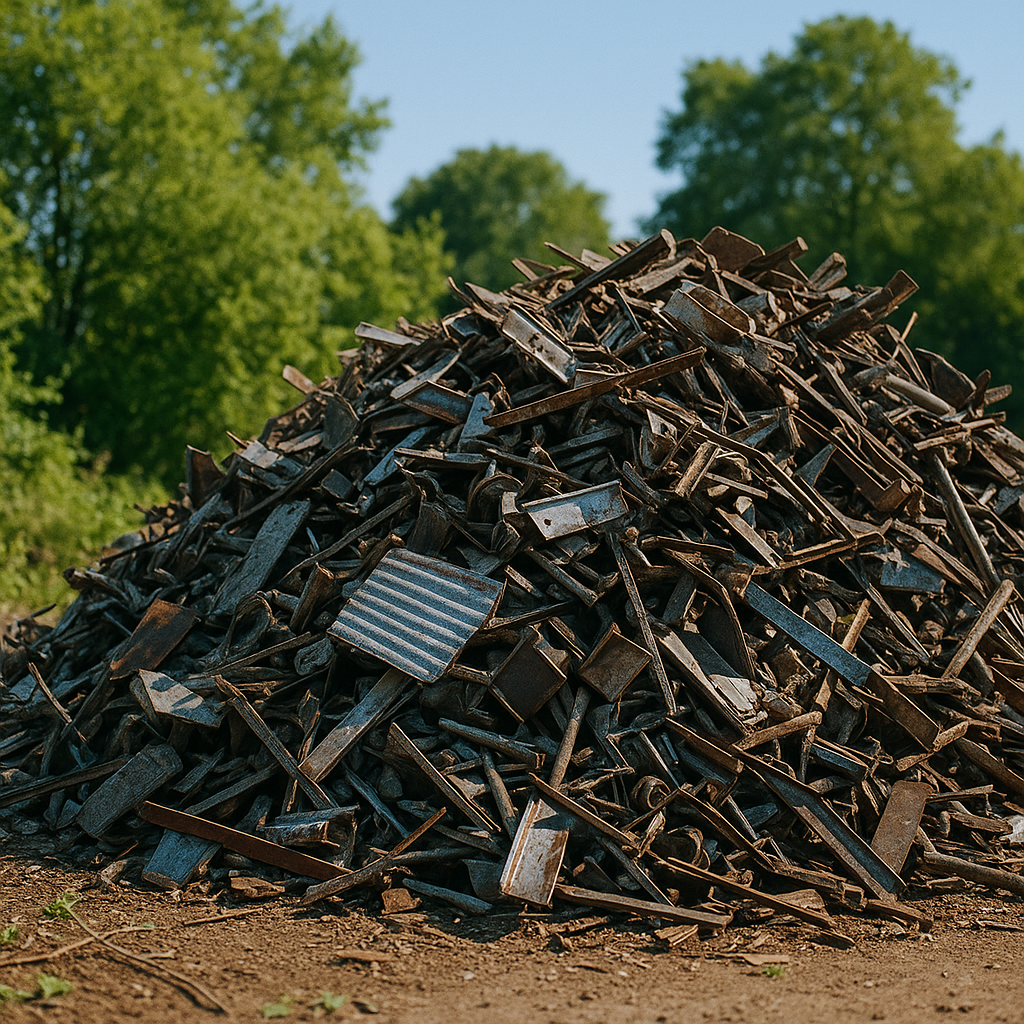
Conserving natural resources is a key benefit of recycling rusty metal. Mining virgin ore causes extensive land disruption and habitat destruction. Each ton of recycled steel saves approximately 2,500 pounds of iron ore, 1,400 pounds of coal, and 120 pounds of limestone that would otherwise be extracted through mining operations.
Energy savings are another significant advantage of metal recycling. Recycling rusty metal requires considerably less energy than producing new metal from raw materials. For example, recycling steel saves up to 74% of the energy needed to create new steel from virgin materials. Similarly, recycled aluminum uses 95% less energy compared to producing aluminum from bauxite ore.
Reducing greenhouse gas emissions is also a major benefit of recycling rusty metal. According to the Environmental Protection Agency, recycling metal reduces greenhouse gas emissions by about 29 million tons of carbon dioxide annually—equivalent to removing approximately 6.3 million cars from the road each year. This substantial reduction occurs because the energy-intensive processes of mining and refining new metal are avoided.
Reducing landfill waste is another valuable outcome of recycling rusty metal. Metal products do not decompose quickly in landfills, taking up space and potentially leaching contaminants into surrounding soil and groundwater. By diverting rusty metal to recycling facilities, we help extend the lifespan of existing landfills and minimize the need for new disposal sites.
The economic benefits of metal recycling are also considerable. The scrap metal recycling industry creates jobs and bolsters local economies. According to industry data, the recycling sector generates billions in economic activity annually and supports hundreds of thousands of jobs nationwide.
Water conservation is another often overlooked benefit. Traditional metal mining and processing consume vast amounts of water and can introduce harmful chemicals into local water supplies. Recycling rusty metal greatly reduces water usage and minimizes the risk of water pollution.
Metals can be recycled repeatedly without losing quality, making them perfect candidates for a circular economy. Unlike some materials that degrade with each recycling cycle, properly processed metal retains its strength and utility no matter how many times it is recycled.
Conclusion: Embracing Rusty Metal Recycling
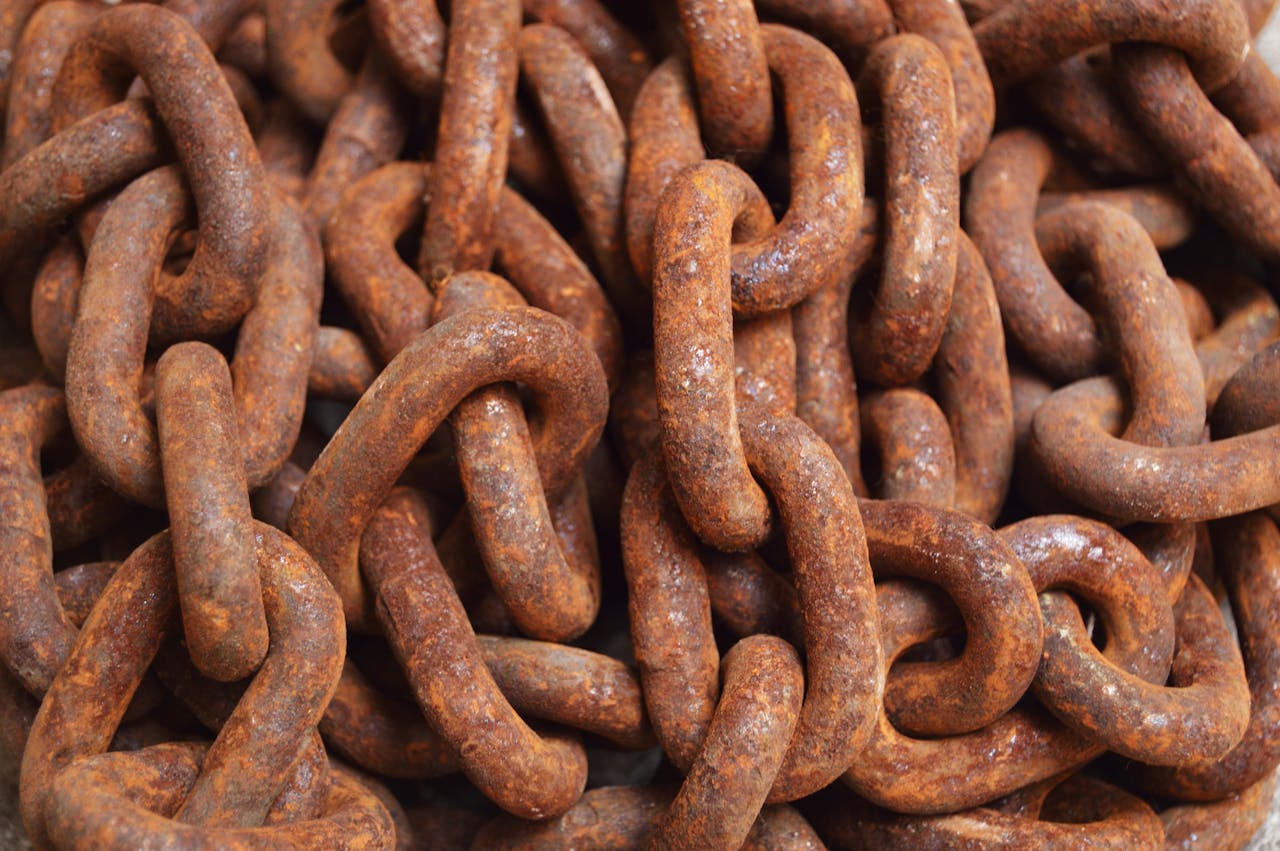
Recycling rusty metal is not only possible but a crucial opportunity for environmental stewardship. The recycling process effectively handles rust through purification methods that separate oxygen from iron during melting. This process makes even heavily corroded items valuable in the recycling stream. While rust may reduce the weight and potentially the payout value of scrap metal, the environmental benefits far exceed these considerations.
The impact of metal recycling extends well beyond individual efforts. Every piece of rusty metal diverted from landfills contributes to significant resource conservation, energy savings, and pollution reduction. Metal recycling can reduce greenhouse gas emissions by hundreds of millions of tons annually and conserve natural resources that would otherwise be depleted through mining and extraction. Additionally, the circular economy of metal recycling creates jobs and economic opportunities that benefit communities directly.
For your recycling needs, contact Okon Recycling at 214-717-4083. Our team specializes in processing all types of metal, including rusty items that might seem worthless. We can guide you through proper preparation steps and ensure your scrap metal finds new life through responsible recycling practices.
